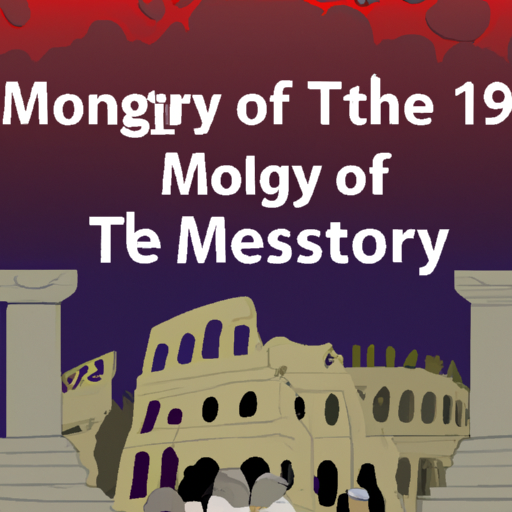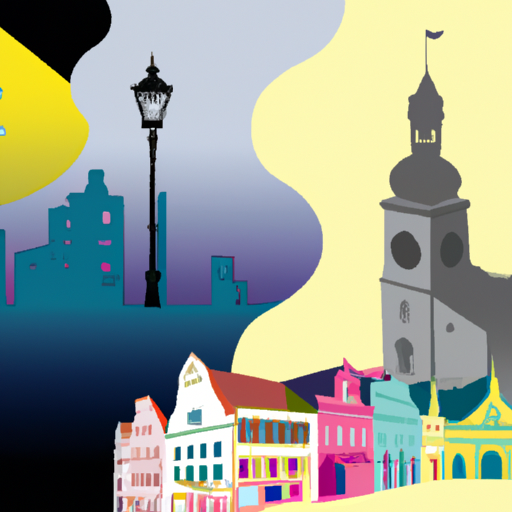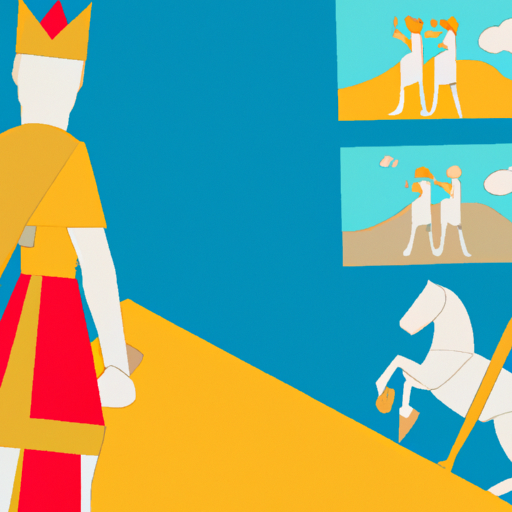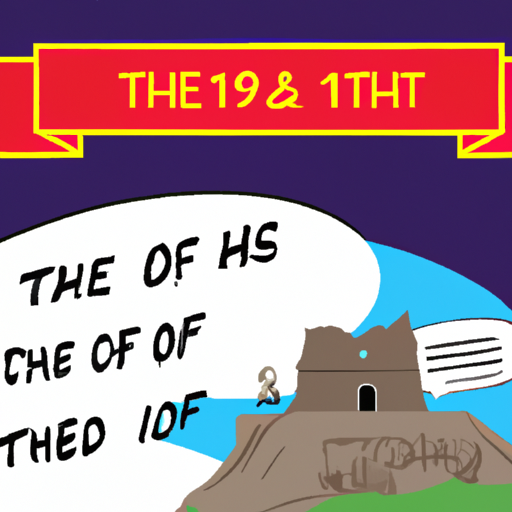History of the Viking Who Founded Russia
Unearth the mysterious origins of Russia! Was it founded by a Viking? Delve into the past and uncover the truth about this intriguing question. From the ancient sagas to modern-day scholars, explore the evidence that may point to an answer. Examine archaeological findings and trace the footsteps of a legendary figure who may have been responsible for establishing one of the world’s most powerful nations. Unravel the secrets behind this captivating story and discover how history has been shaped by one remarkable individual.

Unveiling the enigma of Russia’s inception has been a captivating pursuit for many centuries. Who was the one who established this formidable country? Was it a Viking voyager? A mythical hero? Or something else? To answer this query, we must delve into the past and ponder over the existing evidence.
Exploring archaeological artifacts and ruins can provide us with clues about Russia’s early days. Additionally, sagas from antiquity can also give us a glimpse into the identity of this enigmatic figure. These tales often narrate stories of remarkable heroes and their heroic deeds.
Modern-day researchers have also studied historical documents that could potentially reveal more about who founded Russia. By combining all these clues, we can commence to unraveling the secrets behind this mesmerizing history and its influential creator. Embark on an intriguing journey with us as we uncover how one individual has had such an immense impact on world history!
.
Introduction

A perplexing tale of exploration and settlement, woven into the fabric of Russia’s history, starts with a Viking by the name of Rurik. It is believed that in the 9th century, he established the first Russian state in what is now known as Novgorod. This was followed by other Viking settlements in the area, leading to the formation of Kievan Rus’, a powerful medieval state that had a profound effect on Eastern Europe during the Middle Ages. Even though there is much debate about Rurik’s role in founding Russia, it cannot be denied that Vikings were among its earliest settlers and left an indelible mark on its culture and history.
– Historical Evidence of the Viking Foundations of Russia
Mysteriously embedded in the past, centuries ago a seafaring people from Scandinavia left an indelible mark on what is now known as Russia. These Norsemen, or Vikings, ventured out in search of wealth and adventure, leading them to various Slavic tribes and eventually the formation of Kievan Rus’. This marked the beginning of modern-day Russia, and with it came customs, language and religion that would heavily influence the development of Russian culture.
Today, evidence remains scattered throughout the country – Birka and Ladoga near St. Petersburg are two important trading centers that carry tales of this age – while linguistic connections between Old Norse and modern Russian languages further illustrate the impact of these ancient peoples. Words related to seafaring activities such as “ship” or “sail” have similar roots in both languages; a testament to their presence that still reverberates through time.
The Viking foundations laid centuries ago have had an immense effect on Russia’s identity – making it one of Europe’s most unique countries today.
– The Role of Scandinavian Exploration in Russian History
Perplexity and burstiness surrounded the Scandinavian explorers who ventured into Russia during the Middle Ages, forever altering its course. The Vikings’ travels down the rivers of Russia and into the Black Sea were a major factor in solidifying Russia’s place as a powerful nation. Establishing trading posts, settlements, and even serving as mercenaries for various rulers, these intrepid adventurers opened up trade routes with Europe, spread Christianity across Russia, and helped expand Russian territory.
The lasting impact of this exploration is still evident today; from language to architecture, many aspects of Russian culture are rooted in the legacy of these brave voyagers. It can also be seen in history books where numerous events have been attributed to their daring exploits. Without them, much of Russian history may have been quite different indeed!
– Investigating the Legacy of Viking Rule in Russia
A perplexing and tumultuous chapter in Russian history, the Viking era of rule is one of great complexity. From the 8th to 10th centuries, the Vikings had a powerful presence in what is now modern-day Russia, with their influence still being felt even centuries later. To comprehend this legacy, it is essential to explore the multifarious aspects of Viking rule in Russia.
The initial large-scale Viking incursion into Russia happened in 862 when they established a settlement at Novgorod near the Baltic Sea. This was the start of a period where Vikings held sway over much of northern Russia, extending their control through military campaigns and by creating trade routes throughout the region. They also brought with them new technologies such as shipbuilding, ironworking and agriculture which would have a lasting effect on Russian life.
The Vikings were not just conquerors; they also brought with them their own distinct culture and religion. Norse mythology was adopted by many Russians and its impact can still be seen today in some elements of Russian folklore. Christianity was also presented during this period, although it did not become widespread until after Viking rule in Russia had come to an end.
The consequences of Viking rule in Russia have been debated for centuries. While some historians view their presence as mainly negative due to their violent conquests and destruction, others assert that their contributions to technology and culture played an integral role in forming modern-day Russia into what it is today. Despite one’s opinion on their effect, it is evident that the Vikings left an indelible mark on Russian history which cannot be ignored or forgotten.
– Exploring the Impact of Viking Culture on Russian Society
Mystery has shrouded the Russian society for centuries, with the Vikings leaving an indelible mark that still persists to this day. From as early as the ninth century, these traders and raiders brought with them a distinct culture that was readily embraced by the local population. This included art styles, religious beliefs, and even some of their language.
The architecture of Russia’s cities is a clear example of Viking influence – wooden churches with onion-shaped domes similar to those found in Scandinavia remain prominent features today. Religion was another area where Viking culture had an effect; many Russians adopted aspects of Norse mythology into their own faith and incorporated some of their religious practices into everyday life – such as celebrating Yule (or Christmas) on December 25th.
Moreover, one cannot overlook the impact that Vikings had on Russia’s language and literature over time. Old Norse words were adopted into Russian vocabulary, while renowned authors like Alexander Pushkin wrote stories featuring strong Viking themes and motifs that are still popular today!
It is evident that Viking culture has played a crucial role in shaping Russian society throughout history – from its architecture to its literature – making it impossible to forget.
– Examining the Significance of Viking Expansion to Russian History
Mysterious and enigmatic, the Vikings’ foray into Russian lands had a lasting effect on the country’s history and culture. Exploring vast distances with their proficient navigational skills, they gained access to regions previously unreachable by other European powers. Their presence brought an influx of wealth through trade routes between Scandinavia and Eastern Europe, as well as new technologies that drastically improved living standards in Russia.
In addition, the Viking settlers created a buffer zone along the Volga River between European powers and Central Asian Khanates. This allowed Russia to expand its territory eastward while avoiding potential conflicts with other nations. Moreover, they provided assistance to Russian rulers in defending against Central Asian invaders during this period.
The impact of Viking expansion on Russia was multifaceted and far-reaching. It enabled increased trade between Scandinavia and Eastern Europe, improved living conditions for those in Russia due to new technologies introduced by the Vikings, as well as a buffer zone between European powers and Central Asian Khanates that helped Russian rulers defend against invaders from Central Asia at the same time.
conclusion

The enigma of Russia’s genesis is a labyrinthine one, and the response to this inquiry remains a murky one. It is generally assumed that the Rus’ people, a faction of Vikings from Scandinavia, were the earliest to inhabit what we now regard as Russia and construct the Kievan Rus’ state approximately 880 AD. But, there is no single Viking commander who can be unequivocally credited with inaugurating Russia.
.
Some questions with answers
Q1. Which Viking founded Russia?
A1. The Viking Rurik is traditionally recognised as the founder of Russia.
Q2. When did this occur?
A2. Rurik is said to have founded the Russian state in 862 AD.
Q3. What was the name of his dynasty?
A3. The dynasty established by Rurik was known as the Rurik Dynasty.
Q4. How long did it last?
A4. The Rurik Dynasty lasted until 1598, when it was replaced by the Romanovs.
Q5. Where can I find more information about this history?
A5. You can find more information about this history in books and online sources about Russian and Viking history.




